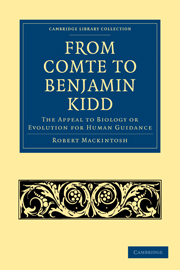Book contents
- Frontmatter
- PREFACE
- Contents
- CHAPTER I INTRODUCTORY
- PART I COMTISM, WITH SOME SCATTERED PARALLELS
- PART II SIMPLE EVOLUTIONISM—SPENCER, STEPHEN
- PART III DARWINISM, OR STRUGGLE FOR EXISTENCE
- CHAPTER XI “DARWINISM IN MORALS”—MISS COBBE'S PROTEST
- CHAPTER XII DARWINISM IN POLITICS—BAGEHOT
- CHAPTER XIII DARWINISM IN ETHICS—PROFESSOR ALEXANDER
- CHAPTER XIV REACTION FROM DARWINISM—HUXLEY
- CHAPTER XV REACTION FROM DARWINISM—DRUMMOND's “ASCENT OF MAN”
- CHAPTER XVI REITERATION OF DARWINISM: ELIMINATION MADE ABSOLUTE—MR. A. SUTHERLAND
- CHAPTER XVII THE METAPHYSICS OF NATURAL SELECTION
- PART IV HYPER-DARWINISM—WEISMANN, KIDD
- Index
CHAPTER XIV - REACTION FROM DARWINISM—HUXLEY
Published online by Cambridge University Press: 29 August 2010
- Frontmatter
- PREFACE
- Contents
- CHAPTER I INTRODUCTORY
- PART I COMTISM, WITH SOME SCATTERED PARALLELS
- PART II SIMPLE EVOLUTIONISM—SPENCER, STEPHEN
- PART III DARWINISM, OR STRUGGLE FOR EXISTENCE
- CHAPTER XI “DARWINISM IN MORALS”—MISS COBBE'S PROTEST
- CHAPTER XII DARWINISM IN POLITICS—BAGEHOT
- CHAPTER XIII DARWINISM IN ETHICS—PROFESSOR ALEXANDER
- CHAPTER XIV REACTION FROM DARWINISM—HUXLEY
- CHAPTER XV REACTION FROM DARWINISM—DRUMMOND's “ASCENT OF MAN”
- CHAPTER XVI REITERATION OF DARWINISM: ELIMINATION MADE ABSOLUTE—MR. A. SUTHERLAND
- CHAPTER XVII THE METAPHYSICS OF NATURAL SELECTION
- PART IV HYPER-DARWINISM—WEISMANN, KIDD
- Index
Summary
It will readily be divined that it is in a special sense we connect the name of Huxley with reaction from Darwinism. From the time when he was converted to the new views, Huxley was perhaps their most brilliant and successful advocate, both in scientific circles and as a populariser, speaking to the world of readers. Yet, in regard to ethics, he was continually restive. The Romanes lecture for 1893 is only the most deliberate among many striking utterances of his, tending in that direction. His thesis runs to the following effect, that evolutionary science has done nothing for ethics ; that, on the contrary, men only become ethical as they set themselves against the principles embodied in the evolutionary process of the animal world. Far from regarding evolution as the master-key to ethics, Huxley insists that the two terms are irreconcilable.
Plainly, Huxley has considered only one possible form of union between evolution and ethics. For him evolution means Darwinism ; the struggle for existence which is believed to have dominated the plant and animal kingdoms. And for him the union of evolution with ethics means not analogy but identity; it means that man, the individual organism, is held to become moral by succeeding in the struggle for existence—a sufficiently startling paradox. Huxley makes no explicit reference to Spencer's formula, tracing a single harmonious process, right back to the primeval nebula and right on to moralised man.
- Type
- Chapter
- Information
- From Comte to Benjamin KiddThe Appeal to Biology or Evolution for Human Guidance, pp. 137 - 142Publisher: Cambridge University PressPrint publication year: 2009First published in: 1899

